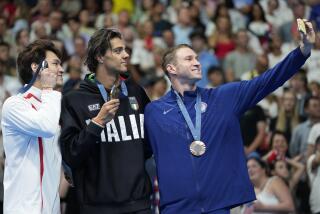His Olympic Debut Is Simply Smashing
- Share via
SYDNEY, Australia — If ever there was a legend before his time, it was Ian Thorpe.
A mural of him towers over downtown Sydney; the newspapers write about him daily (“Thorpe Stands on the Blocks of Destiny”); and the Australian national coach had proclaimed him the greatest swimmer of the century. All of this came to Thorpe before he reached his 18th birthday or his first Olympics.
Thorpe, wise beyond his years, rejected the acclaim, saying that he had achieved nothing until he did it here, on the world’s most important stage for athletes. Only when he won a gold medal and set a world record at the Olympic Games, he said, would his greatness be confirmed, would he acknowledge that his name belonged on the impressive list of Australian swimming heroes such as Dawn Fraser, Murray Rose, Shane Gould and Kieren Perkins.
It took him less than 12 hours Saturday.
“It all went so quickly,” he said.
He set an Olympic record in the 400-meter freestyle Saturday morning at the Sydney International Aquatic Center, which already was known as the ThorpedoDome because of earlier triumphs there, and returned in the evening to break his world record by more than seven-tenths of a second. He made the victory look so easy, winning by almost three seconds over silver medalist Massimiliano Rosolino of Italy and by 6 1/2 seconds over bronze medalist Klete Keller of Phoenix, that it seemed almost anticlimactic when he touched the wall.
That was not the case with his second race about an hour later, the fourth and final leg in the 400 freestyle relay, when he caught and passed American Gary Hall Jr. in the final 50 meters to give the Australians the gold medal by a scant nine-hundredths of a second.
No matter what Thorpe had done before and no matter what he does after--he has two races to go here--it was in those milliseconds that the legend became real. The relay, the final event on a day in which five world records were set, was seen by a frenzied crowd of 17,500. Someday, hundreds of thousands of Australians will claim they were there.
“It was the best race I’ve ever been part of,” said Hall, 25, who won two gold medals and a silver in Atlanta.
Fraser, a three-time Olympian who was officially named the greatest woman swimmer of the 20th century, called it the greatest relay race she has ever seen.
*
As great as the buildup here has been for Thorpe, it has been even greater for the anticipated rivalry between Australia and U.S. swimmers.
Swimming is a national sport here--Fraser rode her eight medals between 1952 and ’60 into political office--and it does not go unremarked upon that the United States has three times more Olympic gold medals in the sport over the years than the Australians. They believe there is no better time than now to start cutting that deficit.
There is a famous swim coach here named Lawrie Lawrence, who is as well known for his rants as for his coaching, and one of them was featured on the giant screen in the Olympic Stadium on Friday night during the opening ceremony.
Thorpe did not go to the opening ceremony, choosing to rest in the athletes’ village, but there is nothing that Lawrence said that the swimmer hasn’t already imagined everyone in Australia screaming at him as he shoulders the nation’s hopes. No, expectations.
The pressure has been enormous, so much so that he moved to Colorado Springs, Colo., for a while this year because he was certain that no one there would know him. That didn’t turn out to be entirely true. After all, Colorado Springs is the home of the training center for USA Swimming, and he was recognized on more than one occasion in the mall. Wherever there are swimmers, there is someone who knows Thorpe.
“I think he was born to swim,” Rosolino said.
“I think he’s the best swimmer in the history of the world,” U.S. swimmer Josh Davis said.
Dara Torres, part of the victorious U.S. women’s 400 relay team Saturday night, said that she saw Thorpe for the first time that morning on a bus and said, “Oh my god,” when she saw the size of his hands.
Of course, she said, she couldn’t help but peek at his feet, the famous size-17 flippers.
“Then he stood up,” she said. “I said, ‘He’s not a boy. He’s like a man.’ ”
There are perhaps only two ways to approach a competition with Thorpe.
One is to act oblivious to him, as Keller does. Then again, it might not be an act. The USC freshman-to-be once fell into the walrus pit at Sea World and, on a previous trip to Sydney, didn’t show up on the bus at the appointed time at the end of the U.S. swimmers’ trip to the zoo. Coaches had to go back and find him in the zoo.
One is to challenge him, as Hall did.
“We’re going to smash them like guitars,” Hall said, predicting great results for the U.S. men against the Australians.
*
Thorpe was nervous before the relay Saturday night, not so much because of the impending competition but because it took him 10 minutes--with the help of four attendants--to get back into his Fastskin bodysuit after the medal ceremony for the 400 freestyle.
Then he returned to the pool deck, and the moment seized him.
“We were like gladiators walking into the Colosseum and feeling sheer noise from the crowd,” he said.
Not merely hearing the noise. Feeling it.
No U.S. men’s team had ever lost the 400 freestyle relay in either the Olympics or the World Championships. The U.S. men were expected to win again here, but it was as if the crowd knew that their Thorpie wouldn’t let them down.
Michael Klim handled the first leg for Australia, setting a world record in the 100 meters.
When he climbed out of the pool, Thorpe told him, “You did 48.18.” The record was 48.21.
“Are you sure?” Klim said.
“I’m pretty sure,” Thorpe said.
The next two Australian swimmers maintained the lead, but Thorpe couldn’t hold it against Hall. That wasn’t necessarily a surprise. Hall excels at 50 meters. If Thorpe had to choose between swimming an open 50 or the 1,500, he’d choose the 1,500.
But Thorpe showed remarkable resiliency, narrowing the lead after the turn and passing Hall with two strokes to go.
His teammates celebrated, strumming air guitars in response to Hall’s earlier taunt.
“That was a lot of fun,” Hall said jovially about the Aussie display. “No, maybe it was a little bit of fun.”
Thorpe didn’t look at his teammates, didn’t even look at the scoreboard to see the results.
A sixth sense told him that he had won and he began celebrating. After winning the 400 freestyle, he had smiled tightly and breathed a sigh of relief. Not this time.
“I was jumping for joy,” he said. “I would have felt like a bit of a fool if I had been wrong.”
Australia celebrated with him.
“It was the best day of my life, the best hour of my life, the best minutes of my life,” he said.
(BEGIN TEXT OF INFOBOX / INFOGRAPHIC)
End of an Era
Australia’s victory in the 400-meter freestyle relay was the first time the United States had lost the event in the Olympics or the World Championships. Olympic results (event not held in 1976 or 1980; * world record):
Year Winner Time
1964 USA 3:32.2*
1968 USA 3:31.7*
1972 USA 3:26.42*
1984 USA 3:19.03*
1988 USA 3:16.53*
1992 USA 3:16.74
1996 USA 3:15.41
2000 Australia 3:13.67*
*
WORLD RECORDS SATURDAY
MEN
100 freestyle (relay)
M. Klim, Australia, 48.18
400 freestyle
Ian Thorpe, Australia, 3:40.59
400 freestyle relay
Australia, 3:13.67
WOMEN
400 freestyle relay
United States, 3:36.61
400 individual medley
Y. Klochkova, Ukraine, 4:33.59
*
Randy Harvey can be reached at his e-mail address: randy.harvey@latimes.com.
More to Read
Go beyond the scoreboard
Get the latest on L.A.'s teams in the daily Sports Report newsletter.
You may occasionally receive promotional content from the Los Angeles Times.






